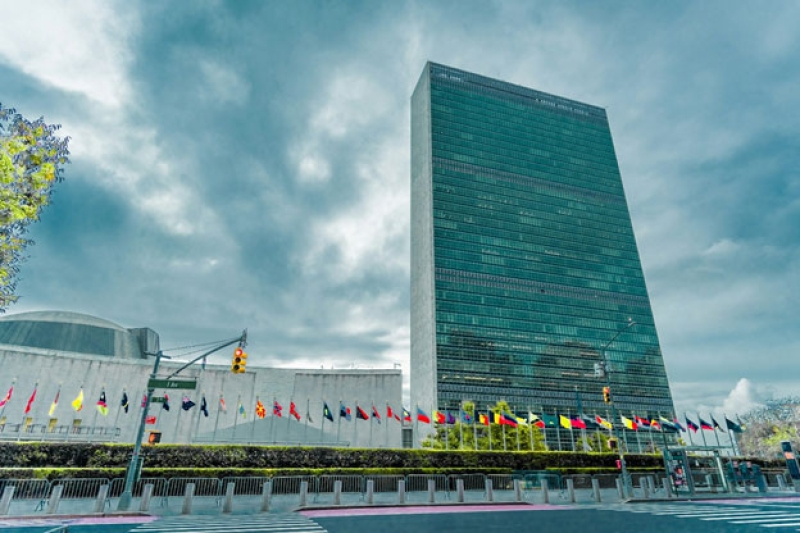- Puppet show enchants Children as Boi Mela comes alive on day 2 |
- DSCC Admin Salam’s drive to make South Dhaka a ‘clean city’ |
- 274 Taliban Dead, 55 Pakistan Troops Killed |
- Now 'open war' with Afghanistan after latest strikes |
- Dhaka's air quality fourth worst in world on Friday morning |
FDI Shortfalls Undermine Global Aid and Humanitarian Relief

Caption:
The United Nations Headquarters in New York. Credit: Unsplash/Nils Huenerfuerst
The world is losing interest in investing in others, especially when it comes to humanitarian aid. Foreign Direct Investment (FDI) has slowed to critical levels, weakening emerging markets and further slowing growth across developing nations.
As of 2025, FDI has dwindled to its lowest levels yet, largely due to heightened trade tensions and increasing barriers to international investment. Lower FDI levels reflect a shift towards domestic and isolationist policies, raising the risk of failed budgetary cooperation with international intergovernmental bodies such as the United Nations.
This trend is already evident in the UN’s budgets for the Secretariat and humanitarian aid operations. With many of the UN’s largest donors cutting back on their contributions, the organization will now see a 20 percent reduction in its workforce (6,900 jobs), in addition to scaling down global aid operations. On June 20, UN Secretary-General Spokesperson Stéphane Dujarric remarked, “No office in the UN will be exempt from the 20 percent reduction, and that includes the Secretary-General’s office.” This suggests the cuts are driven by budget constraints, not managerial restructuring.
Under U.S. President Donald Trump, nearly USD 1.5 billion in missed payments have contributed to a USD 3.7 billion budget cut to the UN. This strain is further exacerbated by overdue payments from China. Together, China and the U.S. make up just over 40 percent of the UN’s total budget.
Severe cuts have also hit the UN Office for the Coordination of Humanitarian Affairs (OCHA), described as “the deepest funding cuts ever to hit the international humanitarian sector.” This has prompted OCHA to launch a new “hyper-prioritized” global appeal aimed at supporting 114 million people facing life-threatening needs worldwide. The new plan requests USD 29 billion—down USD 15 billion from the previous appeal.
“We have been forced into a triage of human survival,” said Tom Fletcher, Under-Secretary-General for Humanitarian Affairs and Emergency Relief Coordinator. “The math is cruel, and the consequences are heartbreaking. Too many people will not get the support they need, but we will save as many lives as we can with the resources we are given.”
The Global Humanitarian Overview for 2025 initially called for USD 44 billion to reach 180 million people out of nearly 300 million in need. But as of June, only USD 5.6 billion has been received—less than 13 percent of the appeal. As a result, aid will be allocated based on cold calculations rather than pure human need.
The new strategy is built around three goals:
Reaching those in the most urgent conditions—levels 4 (Extreme) and 5 (Catastrophic) on the humanitarian scale.
Prioritising life-saving support aligned with the 2025 Humanitarian Response Plan.
Ensuring limited resources are deployed where they can have the most impact, factoring in speed of disbursement.
In his closing remarks, Fletcher stated: “Brutal funding cuts leave us with brutal choices. All we ask is 1 percent of what you chose to spend last year on war. But this isn’t just an appeal for money—it’s a call for global responsibility, for human solidarity, for a commitment to end the suffering.”
The humanitarian aid shortfall has directly coincided with global FDI pullbacks, reflecting decreased donor confidence and less investor interest in fragile states. In FY 2023, developing economies received USD 435 billion in FDI—down from USD 867 billion in 2022 and the lowest since 2005. High-income economies received USD 336 billion, the lowest since 1996. FDI as a share of GDP in developing countries stood at 2.3 percent in 2023—only half of the 2008 peak.
To address this, the World Bank outlined a three-priority policy plan for developing economies:
Redouble efforts to attract FDI by easing restrictions and expediting processes. A 1 percent increase in labour productivity correlates with a 0.7 percent rise in FDI inflows.
Amplify FDI’s benefits by focusing on post-investment development and uplifting marginalised sectors.
Advance global cooperation by encouraging cross-sectoral flows, geopolitical stability, and support mechanisms for developing economies.
Boosting FDI would also signal greater global connectivity, encouraging UN member states to sustain or increase their humanitarian contributions. FDI strengthens the financial backbone of countries in crisis, while UN support depends on states’ willingness to invest in fragile regions.
Without meaningful investment, many economies risk stagnation and permanent marginalisation from the global stage.
Meanwhile, official development assistance (ODA) is also on a downward trend, compounding the crisis.
.

